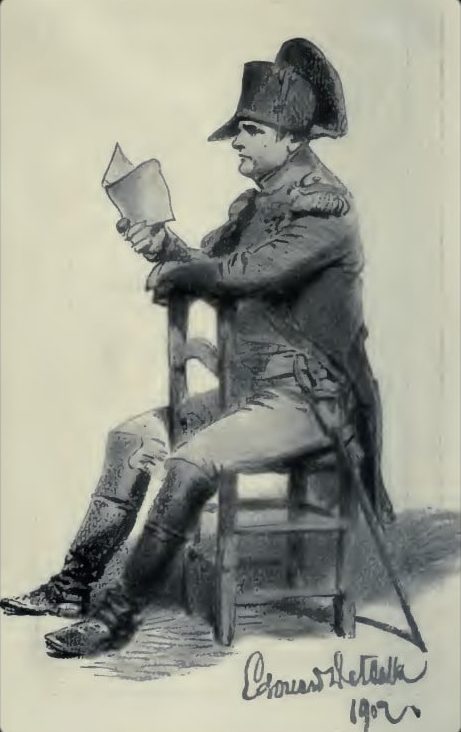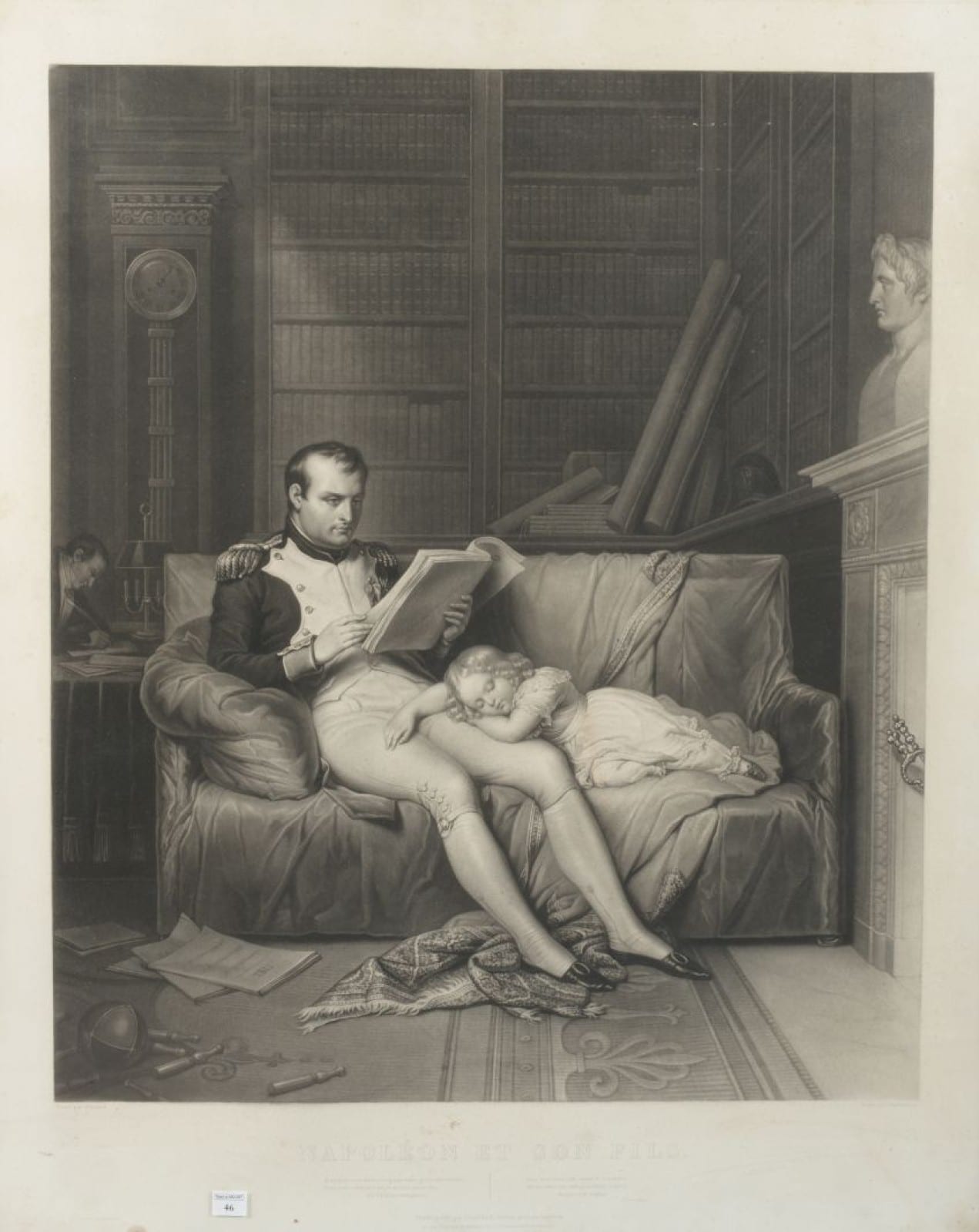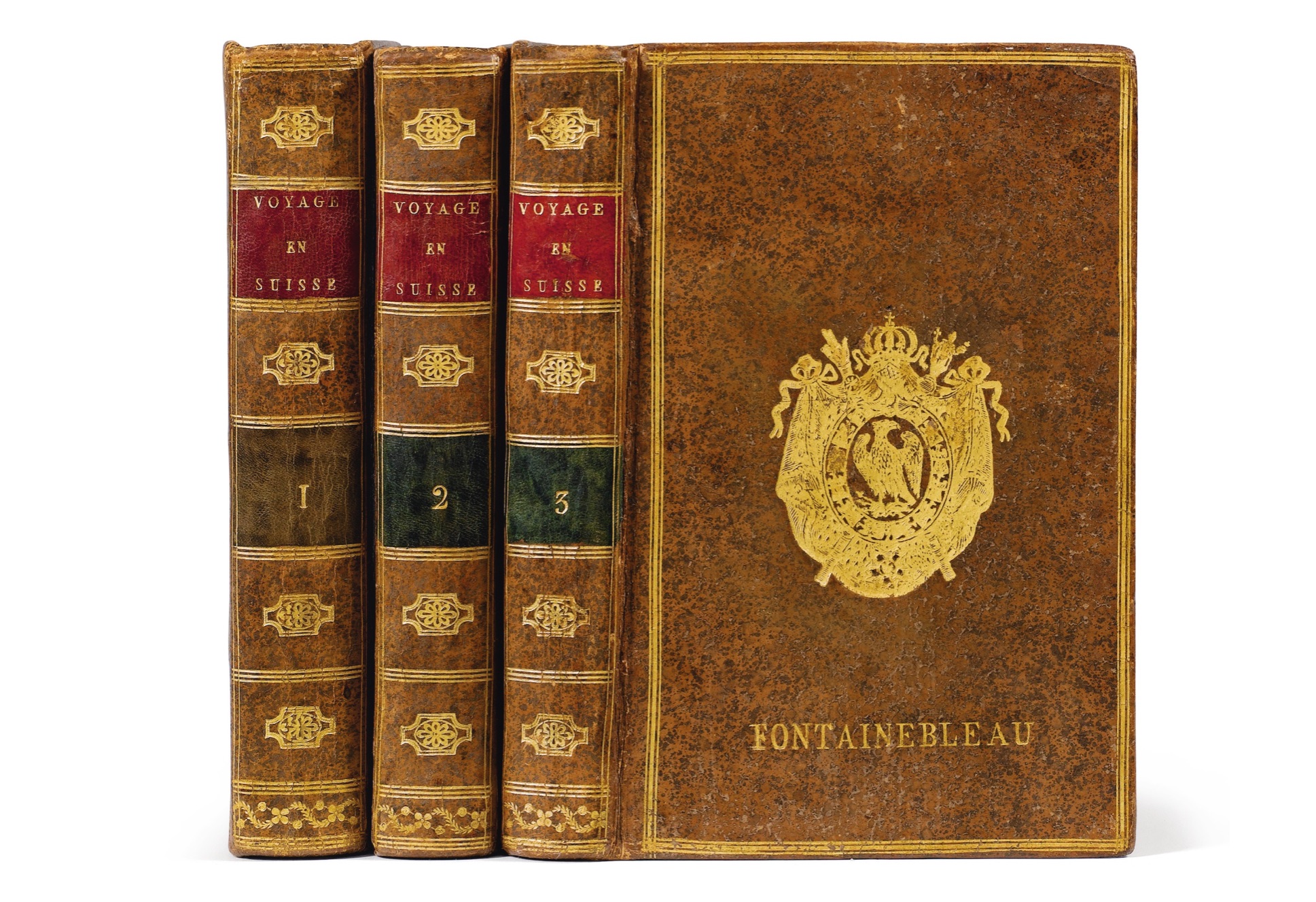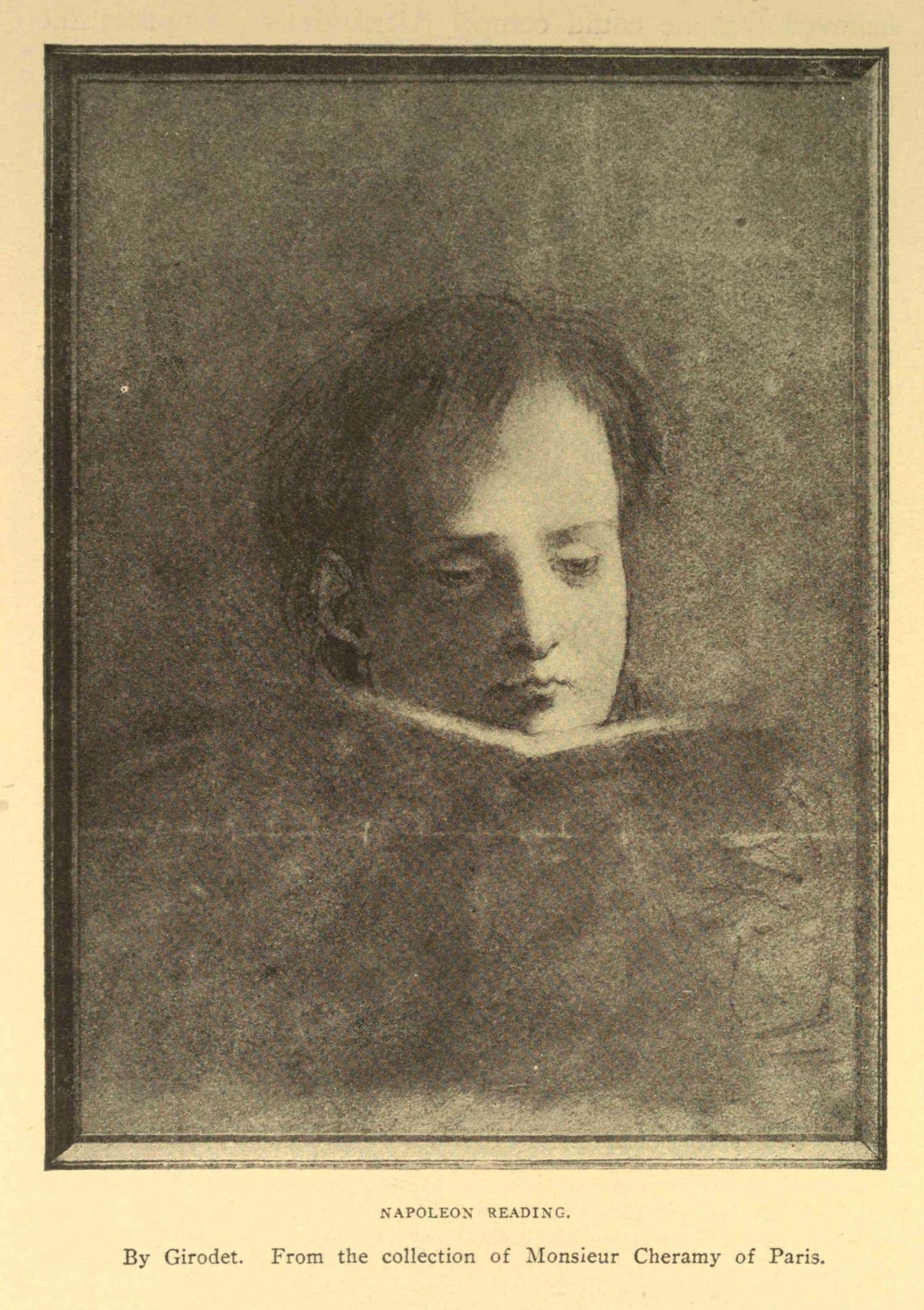An insatiable and demanding reader, Napoleon Bonaparte tirelessly devoured all the books that were useful to him. Curious about everything, he never abandoned any genre. Careful with the books he loved, he had no pity for those he considered only good to feed ... the fireplace!
Napoleon Bonaparte: education through books
The modest library of Charles Bonaparte (1746 – 1785) in the family home of Ajaccio was the first source which watered the future emperor. The young Napoleon discovered there authors who accompanied him all his life: Plutarch, Homer and Virgil to name but a few. His passion for history and politics was born in him; reading a few works on Corsica enriched a patriotism that was initially insular. Then the library of the Royal Military School of Brienne, made available to him during his studies, made him an assiduous reader with an ever more assertive taste for ancient and Renaissance classics. This taste was reproached to him by the one whom Napoleon admired for a long time: Pasquale Paoli (1725 – 1807), Corsican politician, who scolded him with a sharp sarcasm, reproaching his admirer for “being entirely out of Plutarch”. The hero of the young Napoleone was very severe… The first years of lieutenant, officer and then captain Bonaparte were for him occasions of bulimia of reading. The future Napoleon I intended to compensate for his shortcomings by rigorous training in everything he felt he lacked. Brienne had not taught him everything and going to a few salons taught him that he had to enrich himself intellectually. In Valence, the young lieutenant established solid relations with the aptly named bookseller Marc-Aurel, whose library he devoured. The son of the brave scholar will print a writing by Bonaparte when the latter still had some literary pretensions. Bonaparte renewed this relational experience by corresponding for a time with Paul Borde, bookseller in Geneva. The revolutionary period did not only awaken in him a taste for the State and for society. The many upheavals raised questions to which he sought answers everywhere; the works of history and political theory naturally had his full attention. In his own military field too, he studied unceasingly: the principles and history of artillery, the art of siege, Machiavelli or the stories of the campaigns of Frederick the Great (1712 – 1786) were among his readings. More surprisingly, he also set his sights on works whose subjects seem premonitory in the eyes of history. What to think of his readings on Arab cultures, on his interest in their mores and customs, the topography of their countries like that of Egypt and its history? He read – we know from his correspondence and his biographers – books relating to French finances, to the laws of population growth and mortality statistics, to the constitutions of the countries of Asia and of the ancient kingdoms of North America. South. We could sketch through these readings the portrait of an ambitious man, yet all this is in equal measure with his taste for Montaigne and Montesquieu, Rousseau, Buffon and Mirabeau, astronomy, geology and even meteorology. Frantically, he annotated his works – a habit he never lost -, noted words he did not know and patiently enriched his vocabulary. Nothing seems to have left him indifferent and his prodigious memory helping, no doubt that the lessons he drew from his readings made him an enlightened young man but also capable of forming his own opinion, drawing from a large arsenal of knowledge. An asset that undoubtedly made the difference at this troubled turn of the century where opinions could sometimes be worth having their heads cut off …
Once the young general was assigned to the small army of Italy, it was still in the books that Bonaparte prepared his departure. He plunged into it so much and so long that he arrived late own marriage with Joséphine on March 9, 1796 , it was not for lack of having ardently desired this union … The day before, Napoleon had gone to the National Library to consult the books likely to familiarize him with the country which was to make his glory. No doubt he borrowed books or procured them to study at home until late at night. Determined and scrupulous, the preparations for the Italian campaign were made above all by numerous readings which diverted and monopolized the fiancé to the point of making him reject his necessary presence near Beauharnais. Between duty and passion, we will judge the impossible choice that tugged Napoleon!
A few days after 18 Brumaire (November 9, 1799), the books again revealed the interests of the future Napoleon I. The new Consuls undertook to share the library of the Directory; one can imagine Napoleon as an enthusiastic supporter of this decision. Each therefore chose the books which he would make better use of and the rest formed the library of the Council of State. Napoleon’s sights were taken without surprise on the history and military art books. The taste for reading never passed and whether he was Consul or Emperor, he never stopped reading. But our man was on the move and the time of ebook was still far too far away to foreshadow the ease of traveling light! Not having the concern of transporting the heavy works of his library, it was decided – several times – to create a campaign library, the project took a long time to materialize …
Bonaparte's libraries: from palaces to the countryside
Bonaparte’s first library was modest and really took shape during the Italian campaign. These works, generally bound in calfskin, bear on the back the number BP for “Bonaparte – La Pagerie”, the maiden name of Joséphine who loved reading as much as Napoleon enjoyed social life. As soon as he could afford it, Napoleon insisted that he always have at hand the works he wanted or needed. The task was not easy because the general did not keep in place: hardly had he returned from Italy that he had to leave for Egypt and so on. On the ship that took him to Egypt, he prepared his campaign in the same way he had done for that of Italy. The works followed one another so that he familiarized himself as much as possible with the culture, religion, history, topography and customs of the country in which he was preparing to fight. The on-board library contained nearly 300 books which, back in France in 1801, remained for many years in Marseille.
Once emperor, Napoleon I gathered thousands of books in his various libraries in Trianon, Rambouillet, Fontainebleau and especially in Malmaison. The collection included all genres and subjects. At Malmaison, the works bore the number of the first library and sometimes, on the cover, the inscription “Malmaison” in beautiful golden letters. Eugène de Beauharnais (1781 – 1824) inherited this treasure which was dispersed at auction in 1827. In 1815, the fallen emperor took with him into exile some volumes from this library to which he was particularly fond and which he remembered fondly in Saint Helena.
As early as 1809, during the war of the Fifth Coalition, the idea of a campaign library became more pressing. Napoleon I had already demanded it but it seems that it was slow to take shape. The emperor often complained to Antoine Barbier (1765 – 1825) his librarian, but the task was far from easy! Napoleon prescribed a campaign set comprising no less than… 3000 volumes! Something to frighten the most devoted bibliophile! Finally the long-awaited library was assembled for the Russian campaign, finally ready to travel the steppes. The mahogany cases which contained the works were, it seems, made by Jacob Desmalter (1770 – 1841). Librarian Barbier was responsible for filling them in following the recommendations of his imperial sponsor. Without much surprise, we found there a large number of works intended to prepare for the Russian campaign: topography, report on rivers, marshes, woods and paths. And in particular, for the nourishment of the spirit, a small volume of Montaigne. Had young Bonaparte’s interest in meteorology died out? We fear it! And the unfortunate Russian campaign which will severely punish the emperor also led to the disappearance by fire or looting of a large part of the library so long desired.
Here is Napoleon exiled to the Island of Elba. Books were still faithful friends there. He reread the great ancient classics he had loved in his youth and discovered new ones. Thus, Plutarch, Corneille, Racine and Voltaire stood side by side on the shelves with the many volumes of Thousand and one Night . This parenthesis did not last long and Napoleon quickly found the continent. If the campaign in France did not leave him the leisure to read, we find him at the Louvre at the end of March 1815 where he was happy to find his librarian to whom he brought back the books taken for his exile, thus honoring the reputation. that he always had to return a book he had borrowed.
The second exile, which his adversaries will be keen to make final, will not be as favorable as the first to Napoleon’s readings. On June 25, 1815, a few days after his abdication, Bonaparte undertook to prepare for his departure and instructed Antoine Barbier to prepare a library made up of all the campaign books to which should be added books on America, the continent where he was thinking. still be able to establish itself. Four days later, he finally wanted to take the Trianon library. The House of Representatives gave its agreement and it was 1929 books that had to be transported to Malmaison before Bonaparte left for Saint Helena. This was without counting the annoying Gebhard Leberecht von Blücher (1742 – 1819), a Prussian general, who opposed the transport of the books. His emissaries arrived after the departure of the first car and only 588 volumes sailed from Rochefort to Longwood. On his small island lost in the middle of the Atlantic, Napoleon remembered these works, many of which bore the stamp “Cabinet of HM the Emperor and King” as well as his arms, a modest memory of his reign. Until his death, he nevertheless received through his English jailers no less than 1,226 paperback or cardboard books sent from England between 1816 and 1821. We were then closer to the pocket book than to those of the Pléiade, but what does it matter, a reading enthusiast does not dwell on the form as long as the content is good! These books were sold in 1823 in London by Sotheby’s.
Napoleon and reading: formidable efficiency
Each book lover has his little quirks and habits. Some annotate the pages, others fold them, stain them. Still others donate books they didn’t like or leave them in a public place. Napoleon Bonaparte, like any self-respecting reader, also had his little quirks. Manias that were however not accessible to ordinary people!
Bonaparte demanded efficiency everywhere. No convolution for him, the essentials above all else ! So he demanded for his campaign library that the (3000!) Books he wanted to have at hand be all reviewed in order to “correct them, to remove all that is useless like the notes of publishers, all Greek and Latin texts; keep only the French translation. A few only Italian works, of which there would be no translation, could be preserved in Italian. “(Antoine Barbier); efficiency, always. Whether he was busy with something else or tired of reading, his readers took over, although he always preferred Josephine to them who read, it is said, with the particular charm she put in everything. Poor Louis-Antoine Bourrienne (1769 – 1834), who sometimes had to replace her in this task, must have looked very poor!
Finally, there is a habit of the Emperor which always illustrated his intransigence. If a book had the misfortune to displease him, neither one nor two he threw it into the fire! And beware of those close to him who read a work of this kind because Bonaparte reserved the same fate for these books: the stake! Nothing annoyed him so much as wasting his time reading what he considered bad and Claude François de Ménéval (1778 – 1850), private secretary of the Emperor, conjured Barbier during the campaign of 1809 to send Bonaparte to better volumes because disappointing books “just jump out of the mailbox into the fireplace.” We must not send any more such garbage … Send as few verses as you can unless it is from our great poets. »No fireplace nearby? Never mind ! Napoleon threw books out of his car window just as well. The pages of his suite did not fail to collect them from then on, patiently forming a library which – if it had been completely burnt down by the Emperor – occupied them during their numerous trips.
If this portrait of Napoleon reader seems austere, it must finally be softened by the emperor’s taste for lighter readings. So the Mamluk Ali reported that in Saint Helena, Bonaparte enjoyed rereading a work of playful literature almost unmatched in his time: Green-Green written in 1734 by Jean-Baptiste Gresset. The humorous work never failed to make Napoleon laugh who appreciated, when they were well conducted, subjects full of lightness …
Marielle Brie de Lagerac
Marielle Brie de Lagerac est historienne de l’art pour le marché de l’art et l'auteure du blog « L'Art de l'Objet ».



